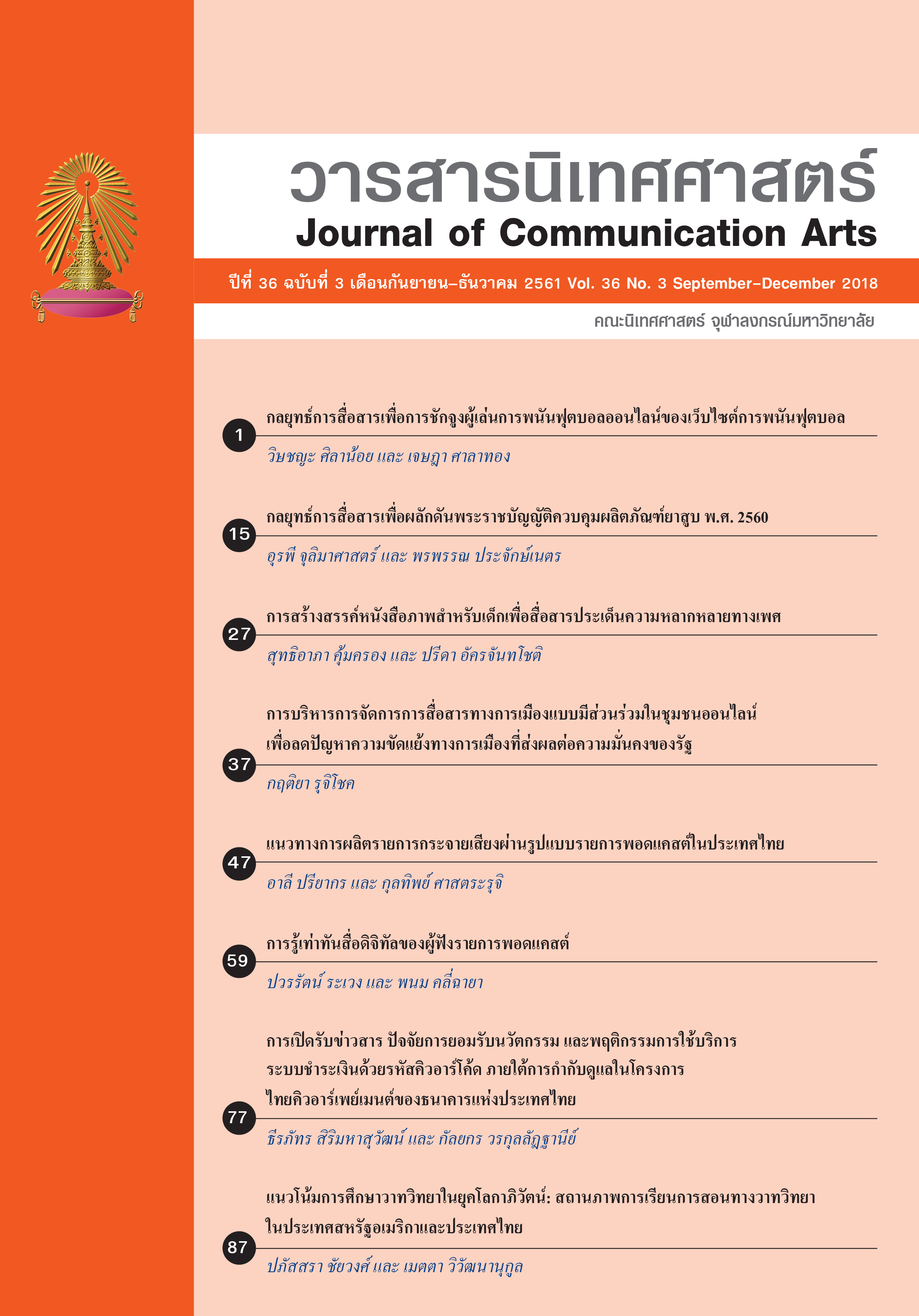Participatory Communication Management of Social Media for Conflicting Political Reduction affected to the stability of state
Main Article Content
Abstract
This research study was conducted to examine and study factors affecting the participatory communication management of social media for reducing political conflict that affects the stability of state. The objectives were to explore and analyze the supporting and non-supporting factors in participatory communication management of social media for reducing political conflict that affects the stability of state and employ this information to build a model. Quantitative and qualitative methodologies were applied in this research for opinion surveys and in-depth interviews. The research instruments were an opinion survey questionnaire and open-ended in-depth interview questions. The factors and strategies that affecting participatory communication management were synthesized to build a model of participatory communication management of social media for reducing political conflict that affects the stability of state. The research results showed that the six supporting factors affecting the participatory communication management of social media for reducing political conflict that affects the stability of state are the politics, society, social media organization, economy, culture and audience. The three non-supporting factors are the communication management budgets of online media organizations, the management systems of private and governmental media organizations and competition in social media between online media organizations. The model can contribute to reducing political conflict by encouraging a process of news management and selection that understands and meets the needs of the media audience and provides relevant information that can increase transparency and reduce misunderstandings that lead to political conflict.
Article Details
References
ทัศนา สลัดยะนันท์ และอังสนา ธงไชย. (2547). การจัดการความรู้ในเครือข่ายอินเทอร์เน็ตไทย. เชียงใหม่ : คณะมนุษยศาสตร์ มหาวิทยาลัยเชียงใหม่.
นิลุบล ใจอ่อนน้อม. (2543 ).การเปิดรับข่าวสารทางการเมืองและการมีส่วนร่วมทางการเมืองของประชาชนในเขตกรุงเทพมหานคร. วิทยานิพนธ์นิเทศศาสตรมหาบัณฑิต บัณฑิตวิทยาลัย จุฬาลงกรณ์มหาวิทยาลัย.
ภราดร จินดาวงศ์. (2549). การจัดการความรู้. กรุงเทพฯ: บริษัทสกายบุ๊คส์ จำกัด.
ระวีวรรณ ประกอบผล. (2528). พฤติกรรมการสื่อสารทางการเมือง. กรุงเทพฯ: คณะนิเทศศาสตร์ มหาวิทยาลัยสุโขทัยธรรมาธิราช.
วิชัย โวหารดี. (2534). พฤติกรรมการรับข่าวสารทางการเมืองในระหว่างการหาเสียงเลือกตั้ง : ศึกษาเฉพาะกรณีการเลือกตั้งซ่อมสมาชิกสภาผู้แทนราษฎร อำเภอเมือง จังหวัดยโสธร พ.ศ. 2530. วิทยานิพนธ์วารสารศาสตรมหาบัณฑิต คณะวารสารศาสตร์และสื่อสารมวลชน มหาวิทยาลัยธรรมศาสตร์.
สุรพงษ์ โสธนะเสถียร. 2541. การสื่อสารกับการเมือง. กรุงเทพฯ: ประสิทธิ์ภัณฑ์แอนด์พี.
เสถียร เชยประทับ. (2540). การสื่อสารกับการเมือง: เน้นสังคมประชาธิปไตย. กรุงเทพฯ: จุฬาลงกรณ์มหาวิทยาลัย.
เสน่ห์ นนทะโชติ. (2524). การสื่อสารทางการเมืองกับการมีส่วนร่วมทางการเมืองของประชาชนในชุมชนบทไทย: ศึกษาเฉพาะกรณีบ้านวังคล้าย อำเภอเสิงสาง จังหวัดนครราชสีมา. วิทยานิพนธ์รัฐศาสตรมหาบัณฑิต บัณฑิตวิทยาลัย จุฬาลงกรณ์มหาวิทยาลัย.
ภาษาอังกฤษ
Ahmad, Khalil and Sajjad, Karim . (2013, July - December). Social Media and Youth Participatory Politics: A Study of University Students. Journal of South Asian Studied. Vol.28, No. 2: 353-360.
Al-Gharibeh, Khaled Mohammad . (2011). The Knowledge Enablers of Knowledge Transfer : An Empirical Study in Telecommunications Companies. IBIMA BusinessReview. Vol. 2011. (Online) Avalable:http://www.ibimapublishing.com/
journals/IBIMABR/ibimabr.html.
Cabalin, Christian. (2014).Online and Mobilized Students:The Use of Facebook in the Chilean Student Protests. Media Education Research Journal. n. 43, v. XXII, ISSN: 1134-3478; e-ISSN: 1988-3293.
Hill, David and Lachelier, Paul. (2014). Can Face-to-Face Mobilization Boost Student Voter Turnout? Results of a Campus Field Experiment. Journal of Higher Outreach & Engagement, Vol.18 Issue 1: 61-87.
Hillary, Shulman C. and Levine, Timothy R. (2012, Jun.). “Exploring Social Norms as a Group-Level Phenomenon: Do Political Participation Norms Exist and Influence Political Participation on College Campuses”. Journal of Communication, Vol 62 Issue 3: 532-552.
Little, S. and Ray, T. (Eds.). (2005). Managing Knowledge. 2nd ed. London: The OpenUniversity and Sage.
Visser, Sara and Stolle, Dietind. (2014, Sep). “The Internet and New Modes of Political Participation: Online Versus Offline Participation.” Information, Communication & Society, 17(8): 937-955.
Weiner, Myron . (1971). “Political Participation : Crisis of the Political Process”. In Leonard, Binder and others (Eds.) Crisis on Sequences in Political Development. Princeton : Princeton University Press.
Zhang Xinzhi and Wan-yin Lin. (2014). “Political Participation in an Unlikely Place: How Individuals Engage in Politics through Social Networking Sites in China”. International Journal of Communication (19328036) Vol. 8: 21-42.

